KMA TO DECONGEST CENTRAL BUSINESS DISTRICT OF KUMASI
Trading activities along the streets and pavements of the Kumasi metropolis is now a brisk business.
Street trade, which hitherto was restricted to only the Central Business District (CBD) of Adum now occur in different parts of the entire metropolis.
Most traders locate themselves at strategic points with heavy human traffic, while others walk from one place to the other.
They locate themselves along main roads and streets especially at intersections where there are traffic lights, near shopping centres and offices or at corners where they can be seen easily by pedestrians and motorists.
The traders settle in streets spontaneously without any official allocation. There are some informal methods used in locating and operating within a particular site, especially on the pavements.
A few traders consult the owners of neighbouring yard, while others negotiate with acquaintances and share with friends and colleagues.
Most street vendors in Kumasi have no authorised sites of operation, which results in incidences of confrontation and brutality between them and city authorities.
The authorities do not want to encourage trading
Again, the Kumasi Metropolitan Assembly (KMA) views vending and hawking on streets as illegal and view vendors as responsible for making the city dirty, obstructing traffic and therefore a public nuisance but has on numerous occasions failed to eject them from the streets as a way of enforcing its by-laws.
Rather, the traders have severally been allocated trading sites outside the CBD and in satellite markets in the metropolis but they have rejected to move there, arguing that they are not accessible to customers.
The traders deal in a number of commodities such as foodstuffs, both fresh and processed, fabrics/clothes, shoes, cosmetics, flowers, hardware, electrical appliances and general merchandise such as office stationary, school supplies, books, sweets, brooms and newspapers among others in different locations of the city.
Those on the pavements use different structures, including tables, racks, wheel barrows and handcarts to display their goods.
Others display their goods on the ground over a mat while others especially those who trade on the streets simply carry their commodities on their hands, heads and shoulders.
There are also those that hang their goods such as clothes on walls, trees, fences and an advanced group that construct temporary shades with stands for displaying their goods.
This type of trade is very common on the road between the Kumasi Club and the H
This manner of expanding street trading has been the order of the day in most areas in the metropolis but surprisingly anytime the KMA have had to initiate a move to eject them from there, the assembly is confronted with the issue of finding an alternative place for them to relocate, forgetting that the KMA did not play any role in settling them on streets.
Some residents have blamed city officials for not having the political will to be firm on ejecting traders from the streets.
They have therefore called on the assembly to be upstanding and always try to nib the canker in the bud at its initial stages the moment an area starts to develop into a market centre, rather than waiting for the area to amass more traders before moving in to eject them.
While the KMA view vending sites as temporary, the vendors view them as permanent and that some confrontations have arisen anytime the assembly initiates a move to sack them from the streets.
Kumasi is notably the commercial hub linking the Northern and Southern 
As a result almost every trader wants to trade in the heart of the city resulting in congestion at the city centre since there are a lot of products that account for the prosperity of commercial activities in Kumasi.
Because of the persistent harassment by city authorities for them to leave the streets in the CBD, they have developed a new strategy of moving away from the CBD and not to the satellite markets in the metropolis, rather to the periphery of the CBD, especially on roads leading to the CBD.
Although it has been argued that vending attracts those who have limited opportunities for obtaining formal employment and prestigious business, and also minimises chances of social exclusion and marginalisation, street vending is increasingly becoming an option for many citizens.
It is no longer limited to the lower social groups, especially the underprivileged who carve out a living in an environment full of harassment by city authorities.
It would therefore be better for the Kumasi Metropolitan Assembly to institute stringent measures to check street trading in order to help avoid possible confrontations with traders in future.
PICTURE SHOWS
The sprawling clothing market on the road in between the Kumasi Club and the High Court in Kumasi





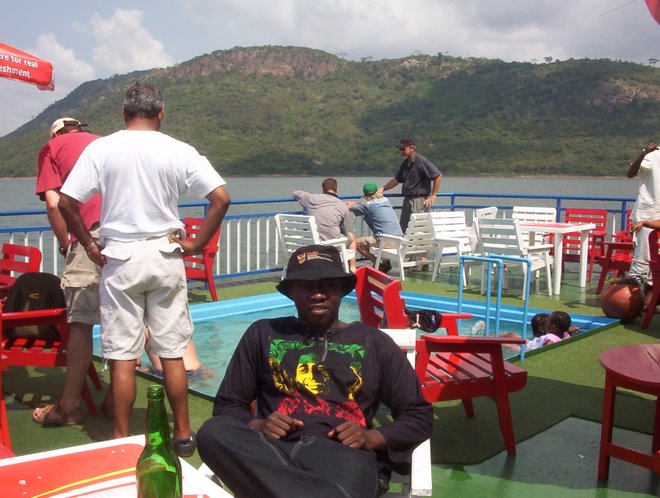









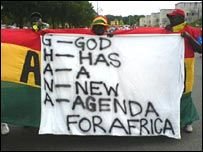









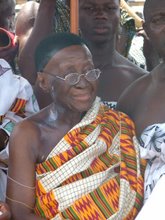
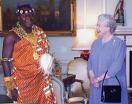



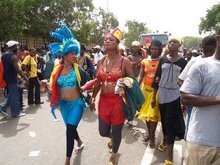
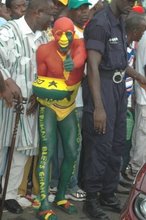

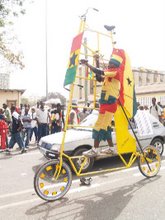
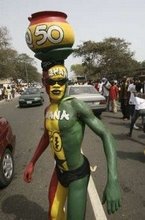




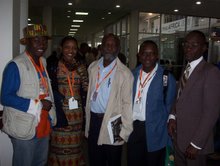
2 comments:
hi i hope the kma take this problem serious because it is really making the whole kumasi town dirty and not safe for all road users but they have to give some place in the market and don't stop publishing since they can relax and do nothing well done enoch.
i just listerned to the news re decongestion which is starting tonight around melcom adum kumasi but i hope it will not be a 9day wonder hard work KMA
Post a Comment